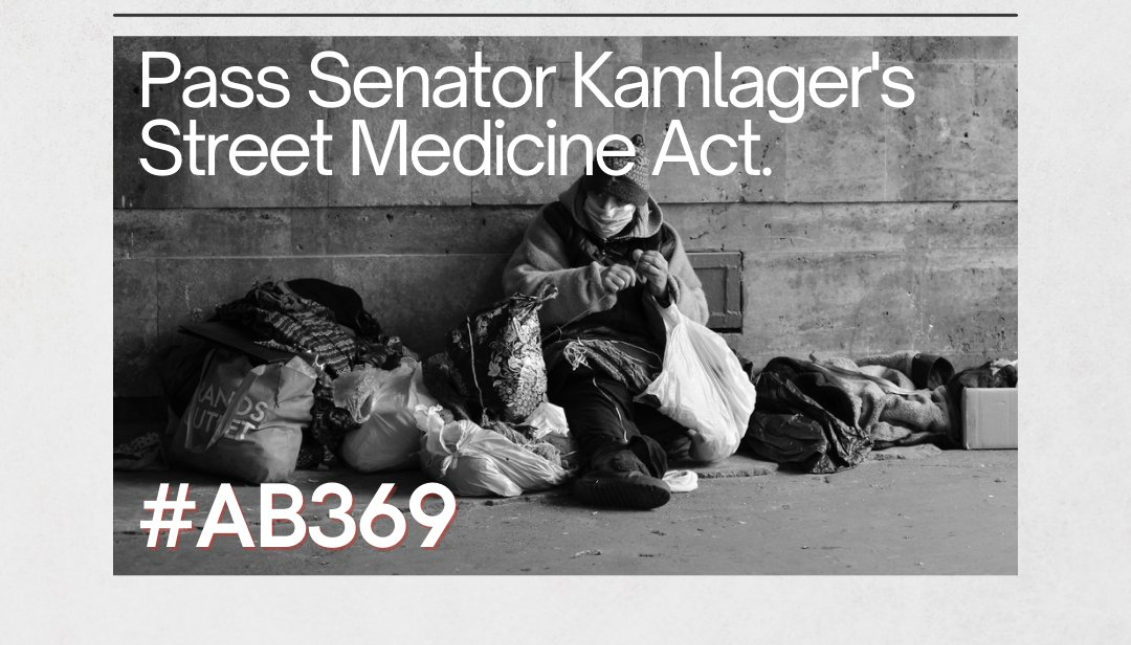
Last year, nearly 23% of the approximately 1,300 homeless people who died in Los Angeles died from underlying health problems. According to the Street Medicine Institute, even for homeless people who have health insurance, 73% have never seen a health care provider.
Assembly Bill 369 (AB 369), a street medicine bill introduced by California Sen. Sydney Kamlager, seeks to remove barriers for the homeless population in Los Angeles, by allowing care is provided outside the walls of traditional medical clinics.
This would include medical care provided on the streets, as well as shelter-based care and services for people living in transitional housing.
“This is a bill about humanity and the salvation of Californians. It’s a crisis that people are homeless and it’s a reality that many homeless people are also sick and in need of medical care like anyone else.” said Kamlager.
Dr. Brett Feldman, director of street medicine at Keck School of Medicine at the University of Southern California, and his wife, Corrine, a medical assistant, are currently the health care providers for a Los Angeles resident who does not have housing named Doug.
Doug lives in a tent overlooking a freeway in downtown Los Angeles while trying to control his diabetes and high blood pressure. Feldmen and Corrine see him twice a week to replenish his prescriptions, monitor his blood pressure, and monitor his overall well-being.
“Street medicine recognizes that homeless people cannot access medical care like the rest of us,” Feldman told LAist.
In 2018, the California Department of Health Care Services established the Medi-Cal Health Homes Program to care for eligible Medi-Cal beneficiaries with complex needs and chronic conditions.
A 2020 UCLA study evaluating the program showed that of all eligible, 13% enrolled successfully, but only 3.5% experienced homelessness.
Feldman said this only highlights the difficulty of caring for homeless people from inside four walls.
Supports Heart of LA # AB369 The Street Medicine Act: Because people suffering from homelessness should have access to health care, regardless of where it is offered. Street medicine programs improve life and health outcomes. It is time to make this law. @sydneykamlager https://t.co/REl1SwbFBx
– HeartLADems (@HeartLADems) August 9, 2021
Doug told LAist that street medicine has been a blessing in his life, and without Feldman and Corrine, he probably wouldn’t take any medication and would be more susceptible to infections.
Street medicine teams like Feldman’s also treat people in transitional housing, including the Roomkey Project, a joint effort by the state, county, and Los Angeles Homeless Services Authority. to convert hotel and motel rooms to apartments.
According to the Street Medicine Institute, the practice has been shown to reduce costly hospital admissions by two-thirds, but Medi-Cal does not recognize the “street” as a place to care for people like Doug, who faces the freeway. or for those living in homes like Project Roomkey.
# AB369 The Street Medicine Act, in part, expands access to Medi-Cal for homeless people who give them access to care outside of traditional settings.
You’ll learn about Doug and Louis, both men without lodging, about how med street teams impact their lives Monday KPCC + @LAist pic.twitter.com/T2s9NolMc0
– Ethan Ward (@iamethanward) August 6, 2021
Kamlager said AB 369 will allow doctors to go out and meet homeless people where they are and be reimbursed for their services, and that it “depends” on Governor Gavin Newsome to sign the bill if approve.
“We should all receive the same treatment and all have access to medical care, and have a doctor who cares enough and is willing to take the necessary steps to receive treatment,” Kamlager told Laist.
The California State Senate is currently debating the bill, and it should land on Governor Newsom’s desk for approval before Oct. 10, the last day in what this year’s legislation can become law.